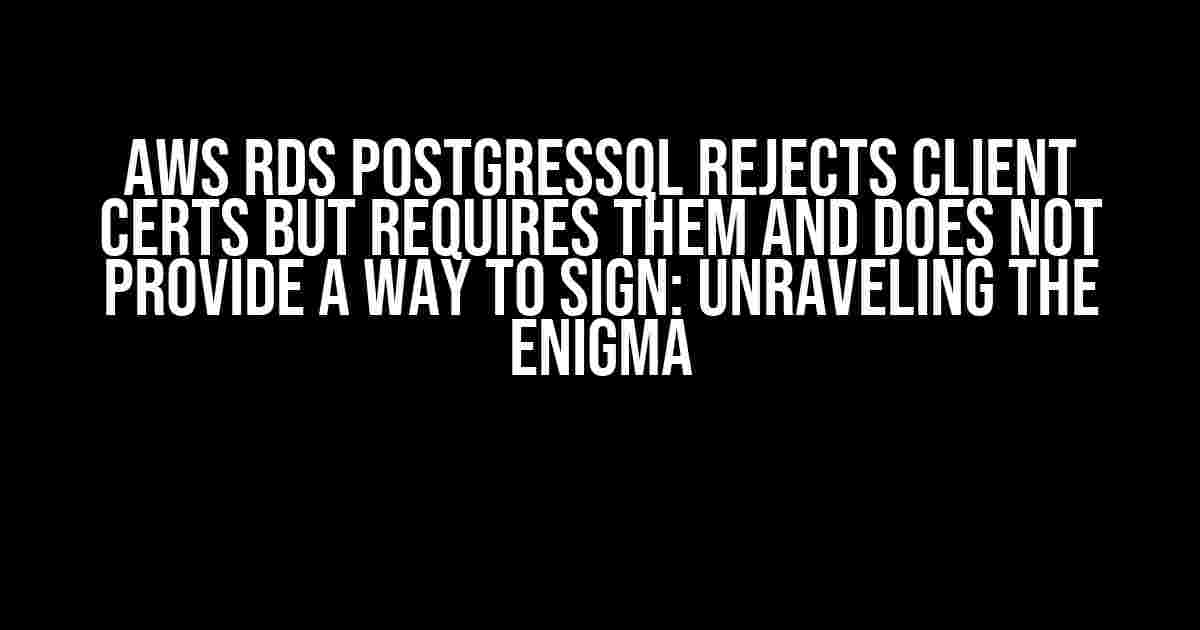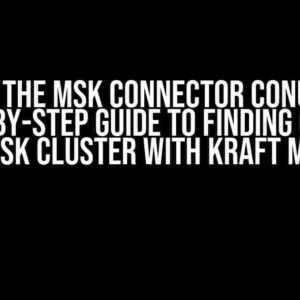If you’re reading this, you’re likely stuck in the perplexing world of AWS RDS PostgresSQL, where client certificates are both required and rejected at the same time. It’s a mind-boggling conundrum that has left many a developer scratching their head. Fear not, dear reader, for we’re about to embark on a journey to unravel this enigmatic puzzle and provide you with clear, step-by-step instructions to overcome this hurdle.
The Paradox of Client Certificates in AWS RDS PostgresSQL
In an ideal world, client certificates would be a straightforward way to authenticate and secure connections to your PostgresSQL database in AWS RDS. However, the reality is that AWS RDS PostgresSQL requires client certificates, but simultaneously rejects them, leaving developers in a state of bewilderment. The cherry on top? There’s no obvious way to sign these certificates in the first place!
Why Client Certificates are Essential for PostgresSQL Security
Before we dive into the meat of the problem, let’s quickly recap why client certificates are crucial for securing your PostgresSQL database:
- Authentication**: Client certificates provide an additional layer of authentication, ensuring that only authorized clients can connect to your database.
- Encryption**: By using client certificates, you can encrypt the data in transit, protecting it from prying eyes.
- Compliance**: Certain regulatory requirements, such as PCI-DSS, mandate the use of client certificates for secure data transmission.
The Root Cause of the Issue: A Certificate Conundrum
So, why does AWS RDS PostgresSQL reject client certificates despite requiring them? The answer lies in the way certificates are handled in AWS RDS:
AWS RDS PostgresSQL uses a self-signed certificate, which is not trusted by default. This means that when you attempt to connect to your database using a client certificate, the connection is rejected because the self-signed certificate is not trusted.
The Catch-22 of Signing Client Certificates
The real kicker is that there’s no straightforward way to sign client certificates in AWS RDS PostgresSQL. You can’t use the AWS Certificate Manager (ACM) or Amazon IAM to sign your client certificates, as these services are not integrated with RDS PostgresSQL.
This creates a classic Catch-22 situation: you need a trusted certificate to connect to your database, but you can’t get a trusted certificate because there’s no way to sign it!
A Step-by-Step Guide to Overcoming the Client Certificate Conundrum
Fear not, dear reader, for we’ve got a solution that will help you navigate this complex issue. Follow these steps to overcome the client certificate conundrum:
Step 1: Create a Self-Signed Certificate Authority (CA)
Create a self-signed CA certificate using OpenSSL:
openssl req -x509 -newkey rsa:2048 -nodes -keyout ca.key -out ca.crt -days 3650 -subj "/C=US/ST=State/L=Locality/O=Organization/CN=Root CA"
This will generate a self-signed CA certificate (ca.crt) and a private key (ca.key).
Step 2: Generate a Client Certificate
Generate a client certificate using the self-signed CA certificate:
openssl req -newkey rsa:2048 -nodes -keyout client.key -out client.csr -subj "/C=US/ST=State/L=Locality/O=Organization/CN=Client Certificate" openssl x509 -req -in client.csr -CA ca.crt -CAkey ca.key -CAcreateserial -out client.crt -days 3650
This will generate a client certificate (client.crt) and a private key (client.key).
Step 3: Configure Your PostgresSQL Server to Use the Self-Signed CA
Update your PostgresSQL server configuration to use the self-signed CA certificate:
alter system set ssl_ca_file = '/path/to/ca.crt'; alter system set ssl_cert_file = '/path/to/server.crt'; alter system set ssl_key_file = '/path/to/server.key';
Restart your PostgresSQL server to apply the changes.
Step 4: Connect to Your PostgresSQL Server Using the Client Certificate
Now it’s time to connect to your PostgresSQL server using the client certificate:
psql "host=localhost port=5432 dbname=mydatabase user=myuser sslmode=verify-full sslcert=client.crt sslkey=client.key sslrootcert=ca.crt"
Congratulations! You’ve successfully connected to your PostgresSQL server using a client certificate.
Conclusion
AWS RDS PostgresSQL’s requirement for client certificates, followed by their rejection, can be a frustrating experience. However, by following the steps outlined in this article, you can overcome this hurdle and secure your database connections using client certificates. Remember to keep your certificates up-to-date and ensure that they’re properly signed to avoid any issues.
With this comprehensive guide, you’re now well-equipped to tackle the enigmatic world of AWS RDS PostgresSQL client certificates. Happy coding!
| Troubleshooting Tips |
|---|
|
Frequently Asked Question
Get the answers to the most pressing questions about AWS RDS PostgresSQL and client certificates!
Why does AWS RDS PostgresSQL require client certificates in the first place?
AWS RDS PostgresSQL requires client certificates as an additional layer of security to verify the identity of clients connecting to the database. This ensures that only authorized users and applications can access sensitive data. Think of it as an extra key to unlock the database treasure chest!
But why does AWS RDS PostgresSQL reject client certificates if they’re required?
That’s a great question! It seems like a contradictory requirement, but the issue lies in the fact that AWS RDS PostgresSQL doesn’t provide a way to sign client certificates. This means that even if you generate a client certificate, the database won’t recognize it as valid. It’s like having a key that doesn’t fit the lock!
What are the consequences of not being able to sign client certificates?
If you can’t sign client certificates, you won’t be able to establish a secure connection to the database. This can lead to security vulnerabilities, unauthorized access, and even data breaches. It’s like leaving the treasure chest unlocked and unguarded!
Is there a workaround to this limitation?
While there isn’t a straightforward solution, you can explore alternative encryption methods, such as SSL/TLS certificates or IAM authentication. These workarounds might require additional setup and configuration, but they can help mitigate the security risks. It’s like finding an alternative path to the treasure chest, even if it’s not the most direct route!
Will AWS RDS PostgresSQL ever support signed client certificates?
While AWS hasn’t made any official announcements, the community has been vocal about this limitation. As the demand for secure database connections grows, it’s possible that AWS will address this issue in the future. Until then, we’ll have to rely on workarounds and creative solutions. Keep your fingers crossed that the treasure chest will soon be fully secure!






